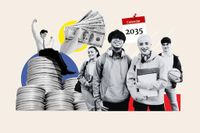Generation Z is poised to become the wealthiest generation in history, according to a recent report from Bank of America. The report highlights that over the next decade, Gen Z, comprising individuals born between 1997 and 2012, is expected to significantly reshape the global economy as it accumulates wealth at an unprecedented rate.
By 2035, Gen Z is projected to amass an income of $36 trillion. As the decade unfolds, these individuals will contribute approximately 30% of the global economy, cementing their status as a formidable economic force. Looking further ahead, by 2040, their accumulated income is expected to surpass an astounding $74 trillion.
A notable reason for this financial leap is the so-called "Great Wealth Transfer." Estimates suggest that around $84 trillion will be redistributed from older generations, particularly Baby Boomers, to younger cohorts, including Gen Z. Becoming heirs to these substantial assets means that Gen Z could receive 38% of these expected inheritances by 2045.
Despite the promising financial forecast, the current reality for many in Generation Z reveals a very different struggle. High costs of living, limited housing opportunities, and skyrocketing education expenses weigh heavily on this generation, contributing to significant debt levels. The Bank of America report affirms that while Gen Z is increasingly feeling the pressure of these financial burdens, its spending habits are reflective of a consumer mentality that prioritizes immediate gratification.
The report outlines that Gen Z is often viewed as a "generation of spenders." With their discretionary cash, they are known to indulge in expenses ranging from luxury goods to experiences such as concerts and vacations. In 2024, Gen Z's global spending was recorded at $2.7 trillion and is anticipated to rise to $12.6 trillion by 2030, signifying a new trend in consumer behavior that is likely to disrupt traditional markets.
The generational shift in spending is attributed partly to their educational levels. As reported, 57% of Gen Zers aged 18 to 21 were enrolled in a two- or four-year college—a figure that surpasses both Millennials at the same age (53%) and Gen X (43%). This investment in education is expected to yield positive returns in terms of higher earnings and employment opportunities, as many college graduates secure better-paying jobs.
Additionally, Bank of America noted that Gen Z has experienced robust wage growth, clocking in an approximate increase of 8% year-over-year recently. This starkly outpaces the overall median growth rate, allowing them some relief in the face of living costs and aiding them in paying down rising debts.
Nonetheless, looming labor market challenges cannot be overlooked. The report highlighted that unemployment rates have escalated for younger entrants into the job market, with approximately 32% more Gen Z households witnessing unemployment in February compared to the previous year. This has sparked concern that despite a promising economic outlook, immediate financial struggles and unemployment rates could detract from their overall potential.
Additionally, many Gen Z cohort members express sentiments of anxiety regarding their economic future. Over 32% of Gen Zers surveyed by the Bank of America reported feeling they are lagging behind their parents in achieving financial security at the same age. This sentiment amplifies their urgency to adapt quickly to the changing economic landscape.
In summary, Generation Z stands at a crossroads where impending wealth through inheritance meets current financial instability. As the Great Wealth Transfer begins and wage growth continues to trend upward, this generation is exhibiting a mix of spending and saving habits that may reshape the economic landscape. Their impact is expected to be profound, not just for themselves but for global markets, traditional practices, and cultural norms associated with consumer behavior. The coming decade will indicate whether they can indeed navigate their financial hurdles and lay claim to their position as the wealthiest generation ever.






